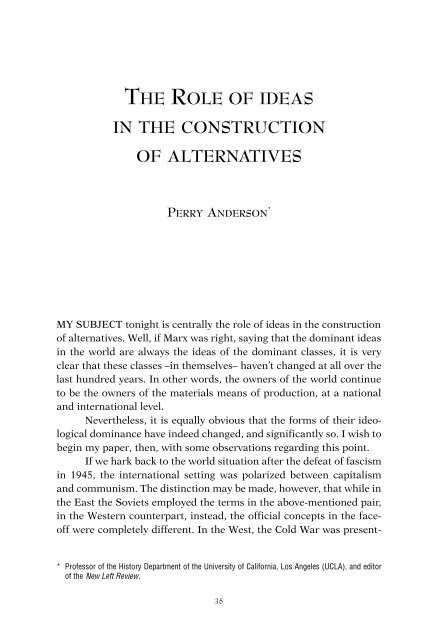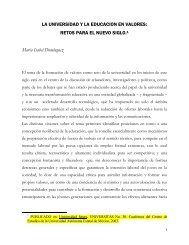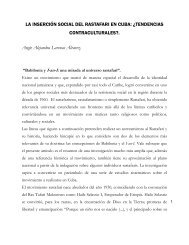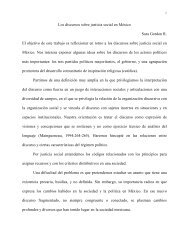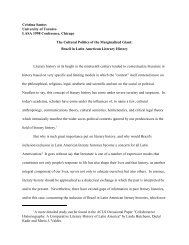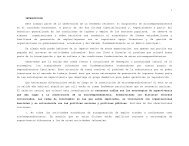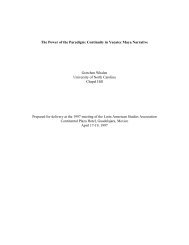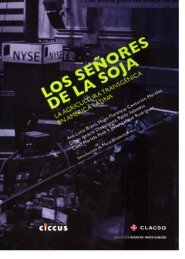the role of ideas in the construction of alternatives - Clacso
the role of ideas in the construction of alternatives - Clacso
the role of ideas in the construction of alternatives - Clacso
You also want an ePaper? Increase the reach of your titles
YUMPU automatically turns print PDFs into web optimized ePapers that Google loves.
THE ROLE OF IDEASIN THE CONSTRUCTIONOF ALTERNATIVESPERRY ANDERSON *MY SUBJECT tonight is centrally <strong>the</strong> <strong>role</strong> <strong>of</strong> <strong>ideas</strong> <strong>in</strong> <strong>the</strong> <strong>construction</strong><strong>of</strong> <strong>alternatives</strong>. Well, if Marx was right, say<strong>in</strong>g that <strong>the</strong> dom<strong>in</strong>ant <strong>ideas</strong><strong>in</strong> <strong>the</strong> world are always <strong>the</strong> <strong>ideas</strong> <strong>of</strong> <strong>the</strong> dom<strong>in</strong>ant classes, it is veryclear that <strong>the</strong>se classes –<strong>in</strong> <strong>the</strong>mselves– haven’t changed at all over <strong>the</strong>last hundred years. In o<strong>the</strong>r words, <strong>the</strong> owners <strong>of</strong> <strong>the</strong> world cont<strong>in</strong>ueto be <strong>the</strong> owners <strong>of</strong> <strong>the</strong> materials means <strong>of</strong> production, at a nationaland <strong>in</strong>ternational level.Never<strong>the</strong>less, it is equally obvious that <strong>the</strong> forms <strong>of</strong> <strong>the</strong>ir ideologicaldom<strong>in</strong>ance have <strong>in</strong>deed changed, and significantly so. I wish tobeg<strong>in</strong> my paper, <strong>the</strong>n, with some observations regard<strong>in</strong>g this po<strong>in</strong>t.If we hark back to <strong>the</strong> world situation after <strong>the</strong> defeat <strong>of</strong> fascism<strong>in</strong> 1945, <strong>the</strong> <strong>in</strong>ternational sett<strong>in</strong>g was polarized between capitalismand communism. The dist<strong>in</strong>ction may be made, however, that while <strong>in</strong><strong>the</strong> East <strong>the</strong> Soviets employed <strong>the</strong> terms <strong>in</strong> <strong>the</strong> above-mentioned pair,<strong>in</strong> <strong>the</strong> Western counterpart, <strong>in</strong>stead, <strong>the</strong> <strong>of</strong>ficial concepts <strong>in</strong> <strong>the</strong> face<strong>of</strong>fwere completely different. In <strong>the</strong> West, <strong>the</strong> Cold War was present-* Pr<strong>of</strong>essor <strong>of</strong> <strong>the</strong> History Department <strong>of</strong> <strong>the</strong> University <strong>of</strong> California, Los Angeles (UCLA), and editor<strong>of</strong> <strong>the</strong> New Left Review.35
NEW WORLDWIDE HEGEMONY. ALTERNATIVES FOR CHANGE ANDSOCIAL MOVEMENTSed as a battle between democracy and totalitarianism. The Westernbloc did not employ <strong>the</strong> term “capitalism” for self-reference, s<strong>in</strong>ce thiswas considered basically as a term <strong>of</strong> <strong>the</strong> enemy’s, a weapon aga<strong>in</strong>st<strong>the</strong> system ra<strong>the</strong>r than a description <strong>of</strong> it. The West expressed itself <strong>in</strong><strong>the</strong> name <strong>of</strong> <strong>the</strong> “Free World,” not <strong>of</strong> <strong>the</strong> “Capitalist World.”In this sense, <strong>the</strong> end <strong>of</strong> <strong>the</strong> Cold War led capitalism, for <strong>the</strong> firsttime <strong>in</strong> history, to beg<strong>in</strong> to proclaim itself as what it was, an ideologythat announced <strong>the</strong> arrival <strong>of</strong> an endpo<strong>in</strong>t <strong>in</strong> social development, constructedon <strong>the</strong> assumptions <strong>of</strong> <strong>the</strong> free market, beyond which it wasimpossible to conceive substantial improvements. Francis Fukuyamagave <strong>the</strong> broadest and most ambitious <strong>the</strong>oretical expression to thisview <strong>of</strong> <strong>the</strong> world <strong>in</strong> his book The End <strong>of</strong> History. But <strong>in</strong> o<strong>the</strong>r, morevague and popular expressions, <strong>the</strong> same message was also spread:capitalism is <strong>the</strong> universal and permanent fate <strong>of</strong> humanity. There isno longer anyth<strong>in</strong>g outside this fulfilled dest<strong>in</strong>y.This is <strong>the</strong> nucleus <strong>of</strong> neoliberalism as an economic doctr<strong>in</strong>ethat is still massively dom<strong>in</strong>ant at government level all over <strong>the</strong> world.This swagger<strong>in</strong>g boastfulness <strong>of</strong> a deregulated capitalism, as <strong>the</strong> best<strong>of</strong> all possible worlds, is a novelty <strong>of</strong> <strong>the</strong> current hegemonic system.Not even <strong>in</strong> Victorian times were <strong>the</strong> virtues and needs <strong>of</strong> <strong>the</strong> reign <strong>of</strong>capital so clamorously proclaimed. The roots <strong>of</strong> this historical changeare clear: it is a product <strong>of</strong> <strong>the</strong> West’s clear victory <strong>in</strong> <strong>the</strong> Cold War. Letit be fully understood: not only <strong>the</strong> defeat but ra<strong>the</strong>r <strong>the</strong> complete disappearance<strong>of</strong> its Soviet adversary, and <strong>the</strong> consequent <strong>in</strong>ebriation <strong>of</strong><strong>the</strong> own<strong>in</strong>g classes, who now no longer needed euphemisms or circumlocutionsto disguise <strong>the</strong> nature <strong>of</strong> <strong>the</strong>ir dom<strong>in</strong>ation.That contradiction between capitalism and communism <strong>in</strong> <strong>the</strong>Cold War period had always been overdeterm<strong>in</strong>ed by ano<strong>the</strong>r globalcontradiction; I refer to <strong>the</strong> struggle between <strong>the</strong> Third World’s nationalliberation movements and <strong>the</strong> First World’s colonial and imperialistpowers. On occasion both struggles fused or crisscrossed each o<strong>the</strong>r,as here <strong>in</strong> Cuba, or <strong>in</strong> Ch<strong>in</strong>a and Vietnam.The result <strong>of</strong> a long history <strong>of</strong> anti-imperialist combat was <strong>the</strong>emergence around <strong>the</strong> world <strong>of</strong> national states that were formallyemancipated from <strong>the</strong> colonial yoke and endowed with juridical <strong>in</strong>dependence,even enjoy<strong>in</strong>g a seat at <strong>the</strong> United Nations. The pr<strong>in</strong>ciple <strong>of</strong>national sovereignty many times violated <strong>in</strong> practice by <strong>the</strong> great powers,but never questioned, or, <strong>in</strong> o<strong>the</strong>r words, always affirmed by <strong>in</strong>ternationallaw and solemnly <strong>in</strong>scribed <strong>in</strong> <strong>the</strong> United Nations Charter,has been <strong>the</strong> major conquest <strong>of</strong> this wave <strong>of</strong> Third World struggles.36
NEW WORLDWIDE HEGEMONY. ALTERNATIVES FOR CHANGE ANDSOCIAL MOVEMENTSmodern life conceivable for humanity from here to eternity; (b) <strong>the</strong>open annulment <strong>of</strong> national sovereignty as a key to <strong>in</strong>ternational relationsamong states, <strong>in</strong> <strong>the</strong> name <strong>of</strong> human rights.Let us briefly give an account <strong>of</strong> a structural connectionbetween <strong>the</strong>se two changes. The unlimited reign <strong>of</strong> capital presupposes<strong>the</strong> de facto cancellation <strong>of</strong> many <strong>of</strong> <strong>the</strong> classical prerogatives <strong>of</strong> anational state which, <strong>in</strong> consequences, loses faculties which used toperta<strong>in</strong> to it, such as controll<strong>in</strong>g <strong>the</strong> exchange rate, <strong>the</strong> <strong>in</strong>terest rate,its fiscal policy and lastly <strong>the</strong> very structure <strong>of</strong> its national budget. Inthis sense, <strong>the</strong> juridical annulment <strong>of</strong> national sovereignty –to <strong>the</strong> benefit<strong>of</strong> military humanism– completes and formalizes an already quiteadvanced process <strong>of</strong> erosion <strong>of</strong> <strong>the</strong> structure <strong>of</strong> <strong>the</strong> nation-state.Now <strong>the</strong>n, are <strong>the</strong>se two ideological transformations enoughfor sett<strong>in</strong>g up a new worldwide hegemony? No, because a hegemonydemands someth<strong>in</strong>g more, demands <strong>the</strong> existence <strong>of</strong> a particularpower that will organize and enforce compliance with <strong>the</strong> generalrules <strong>of</strong> <strong>the</strong> system. In a word, <strong>the</strong>re is no worldwide hegemony withouta hegemonic state. A hegemonic power has to be a particular state–with a series <strong>of</strong> features that, by def<strong>in</strong>ition, cannot be shared byo<strong>the</strong>r states, s<strong>in</strong>ce it is <strong>the</strong>se peculiarities, precisely, that make it asuperpower above <strong>the</strong> o<strong>the</strong>r states. A particular state capable, <strong>the</strong>refore,<strong>of</strong> perform<strong>in</strong>g a universal <strong>role</strong> as guarantor <strong>of</strong> <strong>the</strong> “proper operation”<strong>of</strong> <strong>the</strong> system.We thus still need to mention <strong>the</strong> third and most unexpected <strong>of</strong><strong>the</strong> changes underway. While neoliberalism <strong>of</strong>fers a universal socialand economic framework, “military humanism” proposes a universalpolitical framework. With <strong>the</strong> collapse <strong>of</strong> <strong>the</strong> Soviet bloc, <strong>the</strong> radius <strong>of</strong>action <strong>of</strong> United States hegemony has extended enormously, for <strong>the</strong>first time turn<strong>in</strong>g truly global.One may <strong>the</strong>n ask oneself, how is this new U.S. high-handednessarticulated with <strong>the</strong> ideological <strong>in</strong>novations <strong>of</strong> neoliberalism and <strong>of</strong>military humanism? Unfortunately, <strong>in</strong> a manner totally unth<strong>in</strong>kableonly a few years ago. With a steady tread, imperialism has been fullyand candidly rehabilitated as a highly valuable, moderniz<strong>in</strong>g and civiliz<strong>in</strong>gpolitical system. It was Anthony (Tony) Blair’s advisor onnational security affairs, Robert Cooper, who <strong>in</strong>itiated this contemporarytransvaluation <strong>of</strong> imperialism, giv<strong>in</strong>g as a touch<strong>in</strong>g exampleNATO’s assault on Yugoslavia. Afterwards, Lyndon Johnson’s grandson,<strong>the</strong> constitutional jurist and nuclear strategist Philip Bobbit, predicted<strong>in</strong> his –certa<strong>in</strong>ly enormous– book The Shield <strong>of</strong> Achilles <strong>the</strong> most38
PERRY ANDERSONradical and ambitious <strong>the</strong>orization <strong>of</strong> <strong>the</strong> new United States hegemony.Today, articles, essays and books that celebrate <strong>the</strong> rebirth <strong>of</strong> <strong>the</strong>“American Empire,” typically embellished with lengthy comparisonswith <strong>the</strong> Roman Empire and its civiliz<strong>in</strong>g <strong>role</strong>, cascade from <strong>the</strong> pr<strong>in</strong>t<strong>in</strong>gpresses <strong>in</strong> <strong>the</strong> United States.It must be stressed that this neo-imperialist euphoria isn’t anephemeral excess <strong>of</strong> <strong>the</strong> United States right; <strong>the</strong>re are both Democratsand Republicans <strong>in</strong> its array <strong>of</strong> heroes. For every Robert Kagan or MaxBoot, <strong>the</strong>re is a counterpart like Philip Bobbit or Michael Ignatieff. Itwould be a serious mistake to believe that this is <strong>the</strong> work <strong>of</strong> one manalone. That Ronald Reagan or <strong>the</strong> Bushes –fa<strong>the</strong>r and son– have beencapable by <strong>the</strong>mselves to give life and growth to <strong>the</strong>se <strong>ideas</strong>. It is not so.James Carter and Bill Cl<strong>in</strong>ton, too, with <strong>the</strong>ir Zbigniew Brzez<strong>in</strong>skis andSamuel Bergers, have made <strong>the</strong>ir contributions, play<strong>in</strong>g equally fundamental<strong>role</strong>s <strong>in</strong> <strong>the</strong> development <strong>of</strong> this political scene.We could state it <strong>in</strong> <strong>the</strong> follow<strong>in</strong>g manner: both neoliberalism andneo-imperialism have been politically bipartisan <strong>in</strong> <strong>the</strong> United States, asalso <strong>in</strong> its closest ally, <strong>the</strong> United K<strong>in</strong>gdom. It is not that <strong>the</strong> <strong>role</strong> <strong>of</strong> <strong>the</strong>c e n t e r-right and <strong>the</strong> performance <strong>of</strong> <strong>the</strong> center-left have been identical <strong>in</strong><strong>the</strong>ir emergence and consolidation. Never<strong>the</strong>less, <strong>in</strong> both cases <strong>the</strong>re wasa brief but significant <strong>in</strong>tervention <strong>in</strong> <strong>the</strong> path taken by this phenomenon.Thus, neoconservative monetarism began <strong>in</strong> <strong>the</strong> North under <strong>the</strong>governments <strong>of</strong> James Carter and Callaghan <strong>in</strong> <strong>the</strong> late 1970s; was enormouslypowered and expanded under Ronald Reagan and MargaretThatcher; and f<strong>in</strong>ally consolidated by Bill Cl<strong>in</strong>ton and Tony Blair.A n a l o g o u s l y, <strong>the</strong> first boldly neo-imperialist <strong>in</strong>itiatives were shaped <strong>in</strong>Afghanistan by Brzez<strong>in</strong>ski; extended to Nicaragua, Grenada, Libya ando<strong>the</strong>r places by Casey and We<strong>in</strong>berger; and normalized as part <strong>of</strong> <strong>the</strong> system<strong>in</strong> <strong>the</strong> Middle East and <strong>in</strong> <strong>the</strong> Balkans by Albright and Berger.N o w, if <strong>the</strong>se are nowadays <strong>the</strong> ma<strong>in</strong> features <strong>of</strong> <strong>the</strong> new worldwidehegemony <strong>in</strong> <strong>the</strong> battlefield <strong>of</strong> <strong>ideas</strong>, where are <strong>the</strong> ma<strong>in</strong> clusters <strong>of</strong>resistance localized, and what specific forms do <strong>the</strong>y take? If we look at<strong>the</strong> global political scene, we may identify three different geographicalareas where adverse reactions to U.S. hegemony appear.Foci <strong>of</strong> global resistanceAt <strong>the</strong> beg<strong>in</strong>n<strong>in</strong>g <strong>of</strong> 2003 Europe saw <strong>the</strong> biggest street demonstrations<strong>in</strong> its entire history aga<strong>in</strong>st <strong>the</strong> war that was be<strong>in</strong>g readied <strong>in</strong> <strong>the</strong>39
NEW WORLDWIDE HEGEMONY. ALTERNATIVES FOR CHANGE AND SOCIAL MOVEMENTSMiddle East. In Spa<strong>in</strong>, Italy, France, Germany, Brita<strong>in</strong>, millions <strong>of</strong> peoplecame out <strong>in</strong>to <strong>the</strong> streets to express <strong>the</strong>ir opposition to <strong>the</strong> <strong>in</strong>vasion<strong>of</strong> Iraq –even many United States citizens chose to demonstrateaga<strong>in</strong>st this war. The center <strong>of</strong> gravity <strong>of</strong> <strong>the</strong> <strong>in</strong>ternational pacifistmovement has undeniably been European. How much hope may beplaced on <strong>the</strong> reach <strong>of</strong> this major reaction by European public op<strong>in</strong>ion?Could it have been a merely immediate and ephemeral impulse?What was undoubtedly <strong>in</strong>fluential was <strong>the</strong> undisguisable hostility visà-vis<strong>the</strong> policy <strong>of</strong> <strong>the</strong> White House, which cont<strong>in</strong>ues to be reflected <strong>in</strong>all surveys follow<strong>in</strong>g <strong>the</strong> war, as well as <strong>in</strong> a torrent <strong>of</strong> articles, manifestosand outpour<strong>in</strong>gs <strong>in</strong> <strong>the</strong> mass media <strong>of</strong> <strong>the</strong> ma<strong>in</strong> countries on <strong>the</strong>cont<strong>in</strong>ent. A concrete aspect <strong>of</strong> this recent wave <strong>of</strong> anti-U.S. sentimentis <strong>the</strong> affirmation <strong>of</strong> a historical identity, perta<strong>in</strong><strong>in</strong>g to European societiesand absolutely different from that <strong>of</strong> <strong>the</strong> United States. Thephilosopher J. Habermas and many o<strong>the</strong>r European <strong>in</strong>tellectuals andpoliticians <strong>the</strong>orize <strong>the</strong>se differences as a contrast <strong>in</strong> values. Europecont<strong>in</strong>ues to be more humane, more tolerant, more pacific and sociallymore responsible with regard to <strong>the</strong> people governed than its UnitedStates counterpart.It is clear that <strong>the</strong> European capitalist model has, s<strong>in</strong>ce <strong>the</strong>Second World War, been more regulatory and <strong>in</strong>terventionist than that<strong>of</strong> <strong>the</strong> U.S., and that no European state, and <strong>the</strong> European Union evenless so, enjoys a remotely comparable military power to that atWash<strong>in</strong>gton’s disposal. But nowadays neoliberalism reigns <strong>in</strong> allEuropean societies with <strong>the</strong> same watchwords as <strong>in</strong> <strong>the</strong> rest <strong>of</strong> <strong>the</strong>world <strong>in</strong> terms <strong>of</strong> reduction <strong>of</strong> government expenditure, reduction <strong>of</strong>social benefits, deregulation <strong>of</strong> markets, privatization <strong>of</strong> <strong>in</strong>dustriesand public services. In this regard <strong>the</strong> structural differences between<strong>the</strong> European Union and <strong>the</strong> United States are ever smaller. Whatappears is a vague notion that alludes to <strong>the</strong> existence <strong>of</strong> a cultural differencebetween those political units, although, obviously, with everypass<strong>in</strong>g year European societies f<strong>in</strong>d <strong>the</strong>mselves more subord<strong>in</strong>ated to<strong>the</strong> products <strong>of</strong> Hollywood and <strong>of</strong> Silicon Valley. Never<strong>the</strong>less, thisEuropean distance or cultural reaction which we referred to constitutesa very weak basis <strong>in</strong> terms <strong>of</strong> a last<strong>in</strong>g political resistance to <strong>the</strong>United States. This is very clearly seen <strong>in</strong> <strong>the</strong> fact that <strong>the</strong> overwhelm<strong>in</strong>gmajority <strong>of</strong> <strong>the</strong> demonstrators aga<strong>in</strong>st <strong>the</strong> Iraq war should havefervently supported <strong>the</strong> war aga<strong>in</strong>st Yugoslavia, whose justificationand modus operandi were more or less identical. The ma<strong>in</strong> differenceappears to center on <strong>the</strong> fact that at that time <strong>the</strong> president was Bill40
PERRY ANDERSONCl<strong>in</strong>ton, a sumptuous and effusive Democrat with whom so manyEuropeans identified <strong>the</strong>mselves, and not <strong>the</strong> Republican GeorgeBush, who rem<strong>in</strong>ds <strong>the</strong>m <strong>of</strong> an unacceptably sullen and rustic cowboy.In o<strong>the</strong>r words, <strong>the</strong>re is no opposition to neo-imperialism <strong>in</strong> pr<strong>in</strong>ciple;<strong>the</strong>re only exists a “label aversion” aga<strong>in</strong>st <strong>the</strong> figure <strong>of</strong> its currentruler. For this reason, it is no co<strong>in</strong>cidence that after <strong>the</strong> conquest <strong>of</strong>Iraq <strong>the</strong> European pacifist movement f<strong>in</strong>ds itself <strong>in</strong> a situation <strong>of</strong>reflux, accept<strong>in</strong>g <strong>the</strong> fait accompli, and without mak<strong>in</strong>g any type <strong>of</strong> significantmanifestation <strong>of</strong> solidarity with <strong>the</strong> national resistance to <strong>the</strong>occupation. To this is added <strong>the</strong> fact that <strong>the</strong> European governmentsthat have <strong>in</strong>itially opposed <strong>the</strong> <strong>in</strong>vasion <strong>of</strong> Iraq (like Germany, Franceand Belgium) have quickly adapted to <strong>the</strong> conquest, seek<strong>in</strong>g timidly torepair <strong>the</strong>ir relations with <strong>the</strong> White House.Let us now position ourselves <strong>in</strong> <strong>the</strong> Middle East. Here, <strong>the</strong> sett<strong>in</strong>gis a totally different one, s<strong>in</strong>ce combat is be<strong>in</strong>g <strong>of</strong>fered, arms <strong>in</strong>hand, aga<strong>in</strong>st <strong>the</strong> new worldwide hegemony. Both <strong>in</strong> Afghanistan and<strong>in</strong> Iraq, <strong>the</strong> lightn<strong>in</strong>g United States conquest was followed by a tenaciousguerrilla resistance <strong>in</strong> <strong>the</strong> territorial space that still causes <strong>the</strong>U.S. serious difficulties. Additionally, <strong>the</strong>re isn’t <strong>the</strong> slightest doubtabout <strong>the</strong> massive support <strong>of</strong> Arab public op<strong>in</strong>ion <strong>in</strong> <strong>the</strong> entire regionto <strong>the</strong>se national liberation struggles aga<strong>in</strong>st <strong>the</strong> occupiers and <strong>the</strong>irpuppets. It would be surpris<strong>in</strong>g if <strong>the</strong> Arab world did not react <strong>in</strong> thismanner <strong>in</strong> <strong>the</strong> face <strong>of</strong> <strong>the</strong> U.S. aggressions, s<strong>in</strong>ce <strong>the</strong>se take place <strong>in</strong> aformerly colonial area that each day, with Wash<strong>in</strong>gton’s bless<strong>in</strong>g, experiences<strong>the</strong> expansion <strong>of</strong> Israeli colonialism <strong>in</strong> <strong>the</strong> Palest<strong>in</strong>ian territories.From <strong>the</strong> outset, this historical background separates <strong>the</strong> form <strong>in</strong>which <strong>the</strong> Arab opposition is carried out from that <strong>of</strong> <strong>the</strong> Europeanopposition with regard to <strong>the</strong> new worldwide hegemony, and to thisend it must be taken <strong>in</strong>to account that some <strong>of</strong> <strong>the</strong> above-mentionedEuropean powers were <strong>the</strong>mselves <strong>the</strong> orig<strong>in</strong>al colonizers <strong>of</strong> <strong>the</strong>region. But <strong>the</strong>re are two fur<strong>the</strong>r factors that differentiate <strong>the</strong> Arabfrom <strong>the</strong> European resistance. Here, too, a cultural contrast with <strong>the</strong>superpower comes <strong>in</strong>to play –a much deeper contrast than <strong>the</strong> oneexam<strong>in</strong>ed above– because it is susta<strong>in</strong>ed by a millennial religion:Islam. Contemporary Islam is, with all its nuances, <strong>in</strong>f<strong>in</strong>itely less permeableto <strong>the</strong> penetration <strong>of</strong> United States culture and ideology than<strong>the</strong> vague welfare-state identity which <strong>the</strong> Europeans boast. As wehave repeatedly seen, <strong>the</strong> former is capable <strong>of</strong> <strong>in</strong>spir<strong>in</strong>g acts <strong>of</strong> counterattack<strong>of</strong> unparalleled ferocity.41
NEW WORLDWIDE HEGEMONY. ALTERNATIVES FOR CHANGE ANDSOCIAL MOVEMENTSAdditionally, this ancient religious faith melds with a modern nationalistfeel<strong>in</strong>g, rebell<strong>in</strong>g aga<strong>in</strong>st <strong>the</strong> miseries and humiliations <strong>of</strong> aregion governed for decades by corrupt and brutal feudal or puppetrégimes. The comb<strong>in</strong>ation <strong>of</strong> <strong>the</strong> cultural and religious with <strong>the</strong>national endows <strong>the</strong> Islamic-Arab resistance with a strength that willnot be easily exhausted. But at <strong>the</strong> same time, it has its limitations. Itlacks <strong>the</strong> social aspect, a credible alternative vision <strong>of</strong> a modern societyto that which <strong>the</strong> hegemonic power seeks to impose <strong>in</strong> <strong>the</strong> MiddleEast. Meanwhile, <strong>the</strong> diverse tyrannical and backward régimes <strong>of</strong> <strong>the</strong>region cont<strong>in</strong>ue to oppress <strong>the</strong>ir peoples, all <strong>of</strong> <strong>the</strong>m, without exception,be<strong>in</strong>g ready to collaborate with <strong>the</strong> United States, as has beendemonstrated ad libitum by <strong>the</strong> Arab League and by <strong>the</strong> experience <strong>of</strong><strong>the</strong> First Gulf War.We have already mentioned two <strong>of</strong> <strong>the</strong> exist<strong>in</strong>g centers <strong>of</strong> resistance:Europe and <strong>the</strong> Middle East. Let us turn now to develop<strong>in</strong>g <strong>the</strong>third focus <strong>of</strong> resistance, located <strong>in</strong> Lat<strong>in</strong> America.S<strong>in</strong>gularities <strong>of</strong> <strong>the</strong> Lat<strong>in</strong> American resistanceIn Lat<strong>in</strong> America we f<strong>in</strong>d a much stronger and promis<strong>in</strong>g comb<strong>in</strong>ation<strong>of</strong> factors than <strong>in</strong> Europe or <strong>in</strong> <strong>the</strong> Middle East. Here and only here,<strong>the</strong> resistance to neoliberalism and to neo-imperialism melds <strong>the</strong> culturalwith <strong>the</strong> social and national. That is to say, it implies <strong>the</strong> emerg<strong>in</strong>gvision <strong>of</strong> ano<strong>the</strong>r type <strong>of</strong> organization <strong>of</strong> society, and ano<strong>the</strong>rmodel <strong>of</strong> relations among states on <strong>the</strong> basis <strong>of</strong> <strong>the</strong>se three differentdimensions. Of <strong>the</strong> three decisive features that dist<strong>in</strong>guish this regionfrom <strong>the</strong> previous ones, this is <strong>the</strong> first one to underl<strong>in</strong>e.In <strong>the</strong> second place, Lat<strong>in</strong> America is –and this is fact that is frequentlyforgotten– <strong>the</strong> only region <strong>of</strong> <strong>the</strong> world with a cont<strong>in</strong>uous history<strong>of</strong> revolutionary upsets and radical political struggles that extendfor somewhat more than <strong>the</strong> last century. Nei<strong>the</strong>r <strong>in</strong> Asia, nor <strong>in</strong>Africa, nor <strong>in</strong> Europe do we f<strong>in</strong>d <strong>the</strong> equivalent <strong>of</strong> <strong>the</strong> succession <strong>of</strong>revolts and revolutions that have marked <strong>the</strong> specific Lat<strong>in</strong> Americanexperience. The twentieth century began with <strong>the</strong> Mexican Revolutionthat took place before <strong>the</strong> First World War. It was a victorious revolution,but also one that was “purified” as regards many <strong>of</strong> its popularaspirations. Between <strong>the</strong> two wars <strong>the</strong>re was a series <strong>of</strong> heroic upris<strong>in</strong>gsand political experiments that were defeated but deserve to beremembered: Sand<strong>in</strong>ism <strong>in</strong> Nicaragua, <strong>the</strong> Aprist revolt <strong>in</strong> Peru, <strong>the</strong>42
PERRY ANDERSON<strong>in</strong>surrection <strong>in</strong> El Salvador, <strong>the</strong> revolution <strong>of</strong> 1933 <strong>in</strong> Cuba, <strong>the</strong> ris<strong>in</strong>g<strong>in</strong> Brazil, <strong>the</strong> brief socialist republic and <strong>the</strong> popular front <strong>in</strong> Chile.With <strong>the</strong> Second World War, however, a new cycle began: firstPeronism <strong>in</strong> its Jacob<strong>in</strong> phase <strong>in</strong> Argent<strong>in</strong>a, <strong>the</strong> Bogotazo <strong>in</strong> Colombiaand <strong>the</strong> Bolivian revolution <strong>of</strong> 1952. At <strong>the</strong> end <strong>of</strong> <strong>the</strong> decade <strong>the</strong>Cuban Revolution burst out. There followed a new wave <strong>of</strong> guerrillastruggles all across <strong>the</strong> cont<strong>in</strong>ent, and lastly we cannot fail to mention<strong>the</strong> election <strong>of</strong> <strong>the</strong> government <strong>of</strong> Salvador Allende <strong>in</strong> Chile.All <strong>the</strong>se experiments were crushed with <strong>the</strong> cycle <strong>of</strong> militarydictatorships that began <strong>in</strong> Brazil <strong>in</strong> 1964 and <strong>the</strong>n cleared <strong>the</strong> way forBolivia, Uruguay, Chile, Argent<strong>in</strong>a <strong>in</strong> <strong>the</strong> leaden 1970s. By <strong>the</strong> middle<strong>of</strong> <strong>the</strong> decade, <strong>the</strong> reaction appeared to be victorious almost everywhere.Aga<strong>in</strong>, however, <strong>the</strong> fire <strong>of</strong> <strong>the</strong> resistance was lit with <strong>the</strong> triumph<strong>of</strong> <strong>the</strong> Sand<strong>in</strong>ist revolution, <strong>the</strong> struggle <strong>of</strong> <strong>the</strong> Salvadoran guerrillas,and <strong>the</strong> massive campaign for direct elections <strong>in</strong> Brazil. Thisonslaught <strong>of</strong> popular <strong>in</strong>surgency, too, was mercilessly disarticulated.In <strong>the</strong> mid-1990s <strong>the</strong>re reigned <strong>in</strong> almost all Lat<strong>in</strong> American countriesnative versions <strong>of</strong> U.S. neoliberalism, <strong>in</strong>stalled or backed byWash<strong>in</strong>gton: <strong>the</strong> governments <strong>of</strong> Carlos S. Menem <strong>in</strong> Argent<strong>in</strong>a,Alberto Fujimori <strong>in</strong> Peru, Fernando Henrique Cardoso <strong>in</strong> Brazil,Sal<strong>in</strong>as de Gortari <strong>in</strong> Mexico, Sánchez de Losada <strong>in</strong> Bolivia, etc.F<strong>in</strong>ally, with a restored, stable democracy, and excellent economicpolicies, <strong>the</strong> Department <strong>of</strong> State believed that Lat<strong>in</strong> America hadbecome a safe and quiet backyard <strong>of</strong> <strong>the</strong> global empire. However, soon<strong>the</strong> political landscape was to become radicalized once more. Themost recent popular cycle, which began with <strong>the</strong> Zapatist revolt <strong>in</strong>Chiapas, has already witnessed <strong>the</strong> arrival <strong>of</strong> Chávez <strong>in</strong> power <strong>in</strong>Venezuela, <strong>the</strong> victories <strong>of</strong> Ignacio Lula da Silva and Néstor Kirchner<strong>in</strong> Brazil and Argent<strong>in</strong>a respectively, <strong>the</strong> collapse <strong>of</strong> Sánchez deLosada <strong>in</strong> Bolivia, and repeated social outbreaks <strong>in</strong> Peru and Ecuador.We still have to mention a third dist<strong>in</strong>ctive feature <strong>of</strong> <strong>the</strong> Lat<strong>in</strong>American scene: here, and only here, do we f<strong>in</strong>d coalitions <strong>of</strong> governmentsand movements <strong>in</strong> a broad front <strong>of</strong> resistance to <strong>the</strong> new worldwidehegemony. In Europe, <strong>the</strong> pacifist and alterglobalist movementhas been much more extensive than <strong>the</strong> diplomatic opposition bysome governments to <strong>the</strong> war <strong>in</strong> Iraq. This asymmetry between <strong>the</strong>street and <strong>the</strong> palace has been one <strong>of</strong> <strong>the</strong> most significant features <strong>of</strong><strong>the</strong> European situation, where <strong>the</strong> majority <strong>of</strong> governments –GreatBrita<strong>in</strong>, Spa<strong>in</strong>, Italy, <strong>the</strong> Ne<strong>the</strong>rlands, Portugal, Denmark and all <strong>of</strong>Wash<strong>in</strong>gton’s new satellites <strong>in</strong> Eastern Europe– not only backed <strong>the</strong>43
NEW WORLDWIDE HEGEMONY. ALTERNATIVES FOR CHANGE ANDSOCIAL MOVEMENTSaggression aga<strong>in</strong>st Iraq, but participated <strong>in</strong> <strong>the</strong> occupation, while <strong>the</strong>majority <strong>of</strong> <strong>the</strong>ir populations opposed <strong>the</strong> war. In <strong>the</strong> Middle East, thisasymmetry between <strong>the</strong> virtually unanimous opposition <strong>of</strong> <strong>the</strong> streetto <strong>the</strong> conquest <strong>of</strong> Iraq and <strong>the</strong> virtually unanimous complicity <strong>of</strong> <strong>the</strong>régimes with <strong>the</strong> aggressor is even more dramatic, or <strong>in</strong>deed total. InLat<strong>in</strong> America, <strong>in</strong> contrast, one sees a series <strong>of</strong> governments that todiverse degrees and <strong>in</strong> different fields try to resist <strong>the</strong> will <strong>of</strong> <strong>the</strong> hegemonicpower, and a set <strong>of</strong> typically more radical social movementsthat fight for a different world, without diplomatic or ideological <strong>in</strong>hibitions;<strong>the</strong>re one f<strong>in</strong>ds from <strong>the</strong> Zapatists <strong>in</strong> Mexico and <strong>the</strong> members<strong>of</strong> <strong>the</strong> Landless Movement (MST) <strong>in</strong> Brazil, to <strong>the</strong> coca growers andm<strong>in</strong>ers <strong>of</strong> Bolivia, <strong>the</strong> picketers <strong>in</strong> Argent<strong>in</strong>a, <strong>the</strong> strikers <strong>in</strong> Peru, <strong>the</strong><strong>in</strong>digenist block <strong>in</strong> Ecuador, and so many o<strong>the</strong>rs. This constellationendows <strong>the</strong> resistance front with a repertory <strong>of</strong> tactics and actions,and with a strategic potential, superior to those <strong>of</strong> any o<strong>the</strong>r part <strong>of</strong><strong>the</strong> world. In Asia, for example, <strong>the</strong>re may be governments that arefirmer <strong>in</strong> <strong>the</strong>ir opposition to United States economic and ideologicalcommands –Mahathir’s Malaysia is an obvious case– but powerfulsocial movements are lack<strong>in</strong>g; and where such movements exists, <strong>the</strong>governments typically show <strong>the</strong>mselves to be to a greater or lesserextent servile, as <strong>in</strong> South Korea, whose president now promisestroops to help <strong>the</strong> occupation <strong>of</strong> Iraq.Limits <strong>of</strong> <strong>the</strong> government-social movementsarticulationTak<strong>in</strong>g <strong>in</strong>to account all that has been said up to this po<strong>in</strong>t, it is logicalthat <strong>the</strong> two most important <strong>in</strong>itiatives for <strong>in</strong>ternational resistance to<strong>the</strong> new worldwide hegemony should have been conceived andlaunched <strong>in</strong> Lat<strong>in</strong> America. The first, <strong>of</strong> course, has been <strong>the</strong> emergence<strong>of</strong> <strong>the</strong> World Social Forum, with its symbolic roots <strong>in</strong> PortoAlegre; and <strong>the</strong> second, <strong>the</strong> creation <strong>of</strong> <strong>the</strong> G-22, <strong>in</strong> Cancún. In bothcases, <strong>the</strong> notable aspect is a true <strong>in</strong>tercont<strong>in</strong>ental resistance front,which <strong>in</strong> very different ways encompassed movements <strong>in</strong> one case andgovernments <strong>in</strong> <strong>the</strong> o<strong>the</strong>r. Now <strong>the</strong>n, both <strong>the</strong> Social Forums and <strong>the</strong>G-22 have concentrated <strong>the</strong>ir resistance efforts on <strong>the</strong> neoliberal sector<strong>of</strong> <strong>the</strong> enemy front, i.e. essentially on <strong>the</strong> economic agenda <strong>of</strong> <strong>the</strong>hegemonic power and its allies <strong>in</strong> <strong>the</strong> wealthy countries. Here, correctly,<strong>the</strong> central targets have been <strong>the</strong> International Monetary Fund(IMF) and <strong>the</strong> World Trade Organization (WTO). In this battle <strong>of</strong> <strong>ideas</strong>44
PERRY ANDERSON<strong>the</strong> notion <strong>of</strong> free markets, <strong>in</strong> o<strong>the</strong>r words, pure and autonomous systems<strong>of</strong> exchange <strong>of</strong> commodities, <strong>of</strong> labor and <strong>of</strong> capital, withoutpolitical or o<strong>the</strong>r <strong>in</strong>terference, have been ever more clearly exposed asmysthification. All markets, at all times, are erected and regulatedpolitically: <strong>the</strong> only pert<strong>in</strong>ent question is what type <strong>of</strong> politics shapesand determ<strong>in</strong>es <strong>the</strong>m. Neoliberalism seeks to impose its “GreatNeoliberalism Transformation” (to employ <strong>the</strong> formula co<strong>in</strong>ed by KarlPolanyi). Like its predecessor, <strong>the</strong> Victorian state, this project on aglobal scale implies <strong>the</strong> imposition <strong>of</strong> trad<strong>in</strong>g rules that favor <strong>the</strong> <strong>in</strong>terests<strong>of</strong> <strong>the</strong> metropolitan states and corporations to <strong>the</strong> detriment <strong>of</strong><strong>the</strong> <strong>in</strong>terests <strong>of</strong> <strong>the</strong> peripheral countries. Protectionism turns <strong>in</strong>to aprivilege reserved to <strong>the</strong> North, while <strong>in</strong> <strong>the</strong> South it is seen as an<strong>in</strong>fraction <strong>of</strong> <strong>the</strong> fundamental laws <strong>of</strong> any healthy economy. Comparedto this hypocrisy, <strong>the</strong> medieval idea <strong>of</strong> a fair price might seem like amodel <strong>of</strong> enlightenment. The attack that was carried out <strong>in</strong> Cancúnaga<strong>in</strong>st <strong>the</strong> ideological arrogance and practical abuses <strong>of</strong> <strong>the</strong> hegemonicpower and its allies hit <strong>the</strong> mark.Never<strong>the</strong>less, and here <strong>the</strong> discrepancies between governmentsand movements stand out, resist<strong>in</strong>g hegemonic pretensions <strong>in</strong> <strong>the</strong>trade area –for example, defend<strong>in</strong>g MERCOSUR aga<strong>in</strong>st <strong>the</strong> FTAA–cannot lead to very encourag<strong>in</strong>g results, if at <strong>the</strong> same time <strong>the</strong> IMFand <strong>the</strong> f<strong>in</strong>ancial markets are docilely obeyed <strong>in</strong> matters as crucial as<strong>in</strong>terest rates, <strong>the</strong> fiscal standards, <strong>the</strong> pension system, <strong>the</strong> so-calledprimary surplus, not to mention responses to <strong>the</strong> popular demand foran egalitarian redistribution <strong>of</strong> land. Here <strong>the</strong> <strong>role</strong> <strong>of</strong> social movementsbecomes decisive. Only <strong>the</strong>ir ability to mobilize <strong>the</strong> masses <strong>the</strong>peasants, workers, <strong>in</strong>formal and precarious workers and employeeswho combat waver<strong>in</strong>g and opportunistic governments –if necessary,without truce– can ensure more egalitarian and fair social policies.The democracy which <strong>the</strong> neoliberal governments <strong>of</strong> <strong>the</strong> last decadeboasted <strong>of</strong> has always been a restricted and elitist affair, with low electoralparticipation and major <strong>in</strong>terference by <strong>the</strong> power <strong>of</strong> money. Ademocracy that practices an effective resistance aga<strong>in</strong>st <strong>the</strong> newworldwide hegemony is someth<strong>in</strong>g different: it requires an exercise <strong>of</strong>power from below, <strong>the</strong> embryonic forms <strong>of</strong> which are be<strong>in</strong>g outl<strong>in</strong>ed<strong>in</strong> <strong>the</strong> “participative budget” <strong>of</strong> Porto Alegre, <strong>the</strong> Bolivian <strong>in</strong>surgencycommittees, <strong>the</strong> self-organization <strong>of</strong> <strong>the</strong> Venezuelan shanty towns, <strong>the</strong>MST’s land takeovers.45
NEW WORLDWIDE HEGEMONY. ALTERNATIVES FOR CHANGE ANDSOCIAL MOVEMENTSWho fights aga<strong>in</strong>st neo-imperialism, and how?We take due note <strong>of</strong> <strong>the</strong> existence <strong>of</strong> promis<strong>in</strong>g outbreaks <strong>of</strong> regional<strong>in</strong>ternational resistance aga<strong>in</strong>st neoliberalism. What is necessary nowis to ask oneself about <strong>the</strong> current situation as regards <strong>the</strong> challeng<strong>in</strong>g<strong>of</strong> neo-imperialism. Here <strong>the</strong> sett<strong>in</strong>g becomes somber. The first SocialForums have carefully avoided <strong>the</strong> apparently too burn<strong>in</strong>g issue <strong>of</strong> <strong>the</strong>new United States bellicosity. In Europe <strong>the</strong>re have been not a fewpeople who, swallow<strong>in</strong>g <strong>the</strong> idea <strong>of</strong> a military humanism <strong>in</strong> defense <strong>of</strong>human rights, backed <strong>the</strong> bomb<strong>in</strong>g <strong>of</strong> Belgrade. Among governments,naturally, one sees even less appetite for fac<strong>in</strong>g <strong>the</strong> hegemonic power<strong>in</strong> its strongest terra<strong>in</strong>, <strong>the</strong> military field. The reaction <strong>of</strong> <strong>the</strong> diverseLat<strong>in</strong> American governments to <strong>the</strong> <strong>in</strong>vasion <strong>of</strong> Iraq could be encapsulatedby <strong>the</strong> immediate repudiation to which <strong>the</strong> unfortunateChilean ambassador to <strong>the</strong> United Nations was subjected by <strong>the</strong>social-democratic President Lagos, when <strong>in</strong> an unguarded momentdur<strong>in</strong>g an <strong>in</strong>formal chat he condemned <strong>the</strong> Anglo-U.S. aggression, andfor this reason received a furious telegram from La Moneda <strong>in</strong> whichhe was ordered to rectify his lapsus. Chile didn’t condemn <strong>the</strong> aggression;it regretted it. The o<strong>the</strong>r Lat<strong>in</strong> American governments haven’tdemonstrated any greater courage: <strong>the</strong> only two exceptions were Cubaand Venezuela.Now <strong>the</strong>n, this resistance front aga<strong>in</strong>st <strong>the</strong> new worldwide hegemonydemands a consistent criticism <strong>of</strong> its key concepts. Here <strong>the</strong> battle<strong>of</strong> <strong>ideas</strong> for <strong>the</strong> <strong>construction</strong> <strong>of</strong> an alternative must concentrate itsaim on two decisive po<strong>in</strong>ts: human rights and <strong>the</strong> United Nations,which have currently turned <strong>in</strong>to <strong>in</strong>struments <strong>of</strong> <strong>the</strong> global strategy <strong>of</strong><strong>the</strong> hegemonic power. Let us first exam<strong>in</strong>e human rights. Historically,<strong>the</strong> declaration that <strong>in</strong>troduced <strong>the</strong>m to <strong>the</strong> world, <strong>in</strong> 1789, has beenone <strong>of</strong> <strong>the</strong> great political feats <strong>of</strong> <strong>the</strong> French Revolution. But, as was tobe expected, this notion, <strong>the</strong> fruit <strong>of</strong> <strong>the</strong> ideology <strong>of</strong> a great bourgeoisrevolution, lacked a philosophical basis to underp<strong>in</strong> it. A right is notan anthropological phenomenon; it is a juridical concept, which hasno mean<strong>in</strong>g outside a legal framework that <strong>in</strong>stitutes this or that right<strong>in</strong> a code <strong>of</strong> law. There cannot be any human rights <strong>in</strong> <strong>the</strong> abstract,which is to say, transcend<strong>in</strong>g any concrete state, <strong>in</strong> <strong>the</strong> absence <strong>of</strong> acode <strong>of</strong> law. To speak <strong>of</strong> human rights as if <strong>the</strong>y could pre-exist beyond<strong>the</strong> laws that would br<strong>in</strong>g <strong>the</strong>m to life is mysthification.46
PERRY ANDERSONIt was because <strong>of</strong> this that a classic utilitarian th<strong>in</strong>ker, JeremyBentham, called <strong>the</strong>m “follies” and Marx, whose op<strong>in</strong>ion <strong>of</strong> <strong>the</strong> formerwas never high, did not hesitate to quote him on this regard.The obvious fact is that <strong>the</strong>re cannot be any human rights as if<strong>the</strong>y were dictated by a universal anthropology, not only because <strong>the</strong>iridea is a relatively recent phenomenon, but also because <strong>the</strong>re is nouniversal consensus on <strong>the</strong> list <strong>of</strong> such rights. Accord<strong>in</strong>g to <strong>the</strong> dom<strong>in</strong>antideology, private property, naturally <strong>in</strong>clud<strong>in</strong>g that which concerns<strong>the</strong> means <strong>of</strong> production, is considered a fundamental humanright, proclaimed as such, for example, <strong>in</strong> <strong>the</strong> war aga<strong>in</strong>st Yugoslavia,when <strong>the</strong> U.S. ultimatum to Rambouillet that set <strong>of</strong>f <strong>the</strong> NATO attackdemanded not only freedom and security for <strong>the</strong> population <strong>of</strong>Kosovo, and <strong>the</strong> free movement <strong>of</strong> NATO troops through Yugoslav territory,but also bli<strong>the</strong>ly stipulated –I quote– that Kosovo must have amarket economy. In fact, with<strong>in</strong> <strong>the</strong> parameters <strong>of</strong> <strong>the</strong> dom<strong>in</strong>ant ideology<strong>in</strong> <strong>the</strong> United States, <strong>the</strong> right to decide is daily opposed to <strong>the</strong>right to life with regard to <strong>the</strong> issue <strong>of</strong> abortion. There is no rationalcriterion for discrim<strong>in</strong>at<strong>in</strong>g among such <strong>construction</strong>s, s<strong>in</strong>ce rightsare by <strong>the</strong>ir constitution malleable and arbitrary, like any politicalnotion: anybody can <strong>in</strong>vent one accord<strong>in</strong>g to his own whim. What <strong>the</strong>ynormally represent is <strong>in</strong>terests, and it is <strong>the</strong> relative power <strong>of</strong> <strong>the</strong>se<strong>in</strong>terests that determ<strong>in</strong>es which <strong>of</strong> <strong>the</strong> rival <strong>construction</strong>s is predom<strong>in</strong>ant.The right to employment, for example, has no status <strong>in</strong> <strong>the</strong> constitutionaldoctr<strong>in</strong>es <strong>of</strong> <strong>the</strong> countries <strong>of</strong> <strong>the</strong> North; <strong>the</strong> right to <strong>in</strong>heritancedoes. To grasp this does not imply any nihilistic position.Although human rights (but not legal rights) are a philosophical confusion,<strong>the</strong>re exist human needs that <strong>in</strong>deed do without any juridicalframework, and correspond <strong>in</strong> part to universal anthropological phenomena–such as <strong>the</strong> need for nourishment, for shelter, for protectionaga<strong>in</strong>st torture or abuse– and partly correspond to demands that are,<strong>in</strong> a Hegelian manner, <strong>the</strong> product <strong>of</strong> historical development, such as<strong>the</strong> freedoms <strong>of</strong> expression, enterta<strong>in</strong>ment, organization, and o<strong>the</strong>rs.In this sense, ra<strong>the</strong>r than <strong>of</strong> rights, it is always preferable to speak <strong>of</strong>needs: a more materialist and less equivocal notion.Let us now turn to our military humanism, <strong>the</strong> illustratedshield <strong>of</strong> human rights under <strong>the</strong> new worldwide hegemony. I havenoticed that <strong>the</strong> Social Forum and more generally <strong>the</strong> alterglobalizationmovements have paid little attention to neo-imperialism, preferr<strong>in</strong>gto concentrate <strong>the</strong>ir fire on neoliberalism. Never<strong>the</strong>less, <strong>the</strong>re isa very simple <strong>in</strong>ternational mobiliz<strong>in</strong>g watchword that <strong>the</strong>y might47
NEW WORLDWIDE HEGEMONY. ALTERNATIVES FOR CHANGE ANDSOCIAL MOVEMENTSadopt. This consists <strong>in</strong> demand<strong>in</strong>g <strong>the</strong> closure <strong>of</strong> all foreign militarybases around <strong>the</strong> world. Currently, <strong>the</strong> United States ma<strong>in</strong>ta<strong>in</strong>s suchbases <strong>in</strong> over a hundred countries throughout <strong>the</strong> planet. We mustdemand that each <strong>of</strong> <strong>the</strong>se bases be closed and evacuated, from <strong>the</strong>oldest and most <strong>in</strong>famous <strong>of</strong> all, here <strong>in</strong> Guantánamo, to <strong>the</strong> newest,<strong>in</strong> Kabul, Bishkek and Baghdad. The same for <strong>the</strong> British, French,Russian and o<strong>the</strong>r bases. What justification is <strong>the</strong>re for <strong>the</strong>se <strong>in</strong>numerabletumors on <strong>the</strong> flanks <strong>of</strong> national sovereignty, o<strong>the</strong>r than simplyla raison d’être <strong>of</strong> <strong>the</strong> empire and its allies?The United States military bases constitute <strong>the</strong> fundamentalstrategic <strong>in</strong>frastructure <strong>of</strong> <strong>the</strong> hegemonic power. The United Nationsprovide an essential superstructure for its new forms <strong>of</strong> dom<strong>in</strong>ation.From <strong>the</strong> first Gulf War onwards, <strong>the</strong> UN has operated as a docile<strong>in</strong>strument <strong>of</strong> its successive aggressions, ma<strong>in</strong>ta<strong>in</strong><strong>in</strong>g, for a decade,<strong>the</strong> crim<strong>in</strong>al blockade <strong>of</strong> Iraq, which has caused between 300,000 and500,000 deaths, most <strong>of</strong> <strong>the</strong>m <strong>of</strong> children; consecrat<strong>in</strong>g <strong>the</strong> NATOattack on Yugoslavia, where it propitiated and cont<strong>in</strong>ues to propitiatepost-sale services to <strong>the</strong> aggressors <strong>in</strong> Kosovo; and now, cooperat<strong>in</strong>gwith <strong>the</strong> occupiers <strong>of</strong> Iraq to set up a government <strong>of</strong> U.S. puppets <strong>in</strong>Baghdad, and collect<strong>in</strong>g funds from o<strong>the</strong>r countries to f<strong>in</strong>ance <strong>the</strong>costs <strong>of</strong> <strong>the</strong> conquest <strong>of</strong> <strong>the</strong> country. S<strong>in</strong>ce <strong>the</strong> disappearance <strong>of</strong> <strong>the</strong>Soviet Union, Wash<strong>in</strong>gton’s command over <strong>the</strong> UN has become almostlimitless. The White House directly, and without any shame, chose <strong>the</strong>current Secretary-General as its adm<strong>in</strong>istrative butler <strong>in</strong> Manhattan,cast<strong>in</strong>g his predecessor aside as <strong>in</strong>sufficiently servile to <strong>the</strong> UnitedStates. The FBI openly eavesdrops on all foreign delegations to <strong>the</strong>General Assembly. The CIA, without even deny<strong>in</strong>g its activities, whichare public knowledge, penetrated <strong>the</strong> corps <strong>of</strong> <strong>the</strong> so-called <strong>in</strong>spectors<strong>in</strong> Iraq, from head to toe. There is no measure <strong>of</strong> bribery or blackmailthat <strong>the</strong> Department <strong>of</strong> State does not employ daily to twist nations’representatives to its will. There are occasions, though <strong>the</strong>y are everrarer, when <strong>the</strong> UN doesn’t explicitly approve <strong>the</strong> projects and decisions<strong>of</strong> <strong>the</strong> United States on which Wash<strong>in</strong>gton unilaterally takes <strong>the</strong><strong>in</strong>itiative, and <strong>the</strong>n <strong>the</strong> UN authorizes <strong>the</strong>m post-facto, as a fait accom -pli. What never happens now is that <strong>the</strong> UN rejects or condemns aUnited States action.The root <strong>of</strong> this situation is very simple. The UN was built up <strong>in</strong><strong>the</strong> days <strong>of</strong> F.D. Roosevelt and Truman as a mach<strong>in</strong>e for <strong>the</strong> dom<strong>in</strong>ance<strong>of</strong> <strong>the</strong> big powers over <strong>of</strong> <strong>the</strong> o<strong>the</strong>r countries <strong>of</strong> <strong>the</strong> world, witha façade <strong>of</strong> equality and democracy <strong>in</strong> <strong>the</strong> General Assembly, and an48
PERRY ANDERSONiron-fisted concentration <strong>of</strong> power <strong>in</strong> <strong>the</strong> hands <strong>of</strong> <strong>the</strong> five permanentmembers <strong>of</strong> <strong>the</strong> Security Council, arbitrarily chosen among <strong>the</strong> victors<strong>of</strong> a war that has no relevance today. This deeply oligarchic structurelends itself to any k<strong>in</strong>d <strong>of</strong> diplomatic command and manipulation.This is what has led <strong>the</strong> organization –which <strong>in</strong> pr<strong>in</strong>ciple ought to bea bulwark <strong>of</strong> <strong>the</strong> national sovereignty <strong>of</strong> <strong>the</strong> poor countries <strong>of</strong> <strong>the</strong>world– to its current prostitution, converted <strong>in</strong>to a mere mask for <strong>the</strong>demolition <strong>of</strong> that sovereignty <strong>in</strong> <strong>the</strong> name <strong>of</strong> human rights, naturallytransformed <strong>in</strong> turn <strong>in</strong>to <strong>the</strong> right <strong>of</strong> <strong>the</strong> hegemonic power to blockade,bomb, <strong>in</strong>vade and occupy lesser countries, accord<strong>in</strong>g to its whim.What conceivable remedy is <strong>the</strong>re to this situation? All projectsfor <strong>the</strong> reform <strong>of</strong> <strong>the</strong> Security Council have sunk on <strong>the</strong> grounds <strong>of</strong> <strong>the</strong>rejection by <strong>the</strong> monopolists <strong>of</strong> <strong>the</strong> veto to give up <strong>the</strong>ir privileges,which <strong>the</strong>y also have <strong>the</strong> power to protect. All demands by <strong>the</strong> GeneralAssembly for a democratization <strong>of</strong> <strong>the</strong> organization have been, and willbe, <strong>in</strong> va<strong>in</strong>. The only plausible solution to this impasse would appear tobe <strong>the</strong> withdrawal from <strong>the</strong> organization <strong>of</strong> one or several large countries<strong>of</strong> <strong>the</strong> Third World, which could de-legitimize it until <strong>the</strong> SecurityCouncil were forced to accept its expansion and a redistribution <strong>of</strong> realpowers with<strong>in</strong> <strong>the</strong> General Assembly. In <strong>the</strong> same way, additionally, <strong>the</strong>only hope for serious nuclear disarmament is <strong>the</strong> withdrawal <strong>of</strong> one orseveral countries <strong>of</strong> <strong>the</strong> Third World from <strong>the</strong> <strong>in</strong>famous Nuclear Non-Proliferation Treaty –which ought to be called Treaty for <strong>the</strong>Preservation <strong>of</strong> <strong>the</strong> Nuclear Oligopoly– to force <strong>the</strong> true, arrogant holders<strong>of</strong> weapons <strong>of</strong> mass destruction to renounce <strong>the</strong>ir privileges.It is necessary to restore and promote any serious resistance to<strong>the</strong> new worldwide hegemony, Samir Am<strong>in</strong> has said here 1 . I agree. Iwill only add that <strong>the</strong> pr<strong>in</strong>ciples <strong>of</strong> equality that are demanded andapplied should be <strong>in</strong>clusive, that is to say, that <strong>the</strong>y not be restricted to<strong>the</strong> economic and social fields with<strong>in</strong> nations, but also be applied topolitical and military aspects among nations.As I see it, we are still far from hav<strong>in</strong>g achieved this order <strong>of</strong>th<strong>in</strong>gs. How far, can be seen <strong>in</strong> <strong>the</strong> latest resolution <strong>of</strong> <strong>the</strong> SecurityCouncil, voted <strong>in</strong> this very month <strong>of</strong> October, and <strong>in</strong> which <strong>the</strong>supreme organ <strong>of</strong> <strong>the</strong> United Nations solemnly welcomes <strong>the</strong> puppetcouncil <strong>of</strong> <strong>the</strong> occupation forces <strong>in</strong> Iraq, call<strong>in</strong>g it <strong>the</strong> <strong>in</strong>carnation <strong>of</strong>Iraqi sovereignty, condemn<strong>in</strong>g <strong>the</strong> acts <strong>of</strong> resistance to <strong>the</strong> occupation,call<strong>in</strong>g on all countries to assist <strong>in</strong> <strong>the</strong> re<strong>construction</strong> <strong>of</strong> Iraq under <strong>the</strong>1 See Samir Am<strong>in</strong>’s article <strong>in</strong> this book.49
NEW WORLDWIDE HEGEMONY. ALTERNATIVES FOR CHANGE ANDSOCIAL MOVEMENTSdesigns <strong>of</strong> <strong>the</strong>se same puppet forces, and nam<strong>in</strong>g <strong>the</strong> United States asrecognized leader <strong>of</strong> a mult<strong>in</strong>ational force <strong>of</strong> occupation <strong>of</strong> <strong>the</strong> country.This resolution, which is noth<strong>in</strong>g else than <strong>the</strong> UN’s act <strong>of</strong> bless<strong>in</strong>gfor <strong>the</strong> conquest <strong>of</strong> Iraq, was unanimously approved. It was signed byFrance, Russia, Ch<strong>in</strong>a, Germany, Spa<strong>in</strong>, Bulgaria, Mexico, Chile,Gu<strong>in</strong>ea, Cameroon, Angola, Syria, Pakistan, <strong>the</strong> United K<strong>in</strong>gdom and<strong>the</strong> United States. The supposedly Gaullist France, <strong>the</strong> supposedlypopular Ch<strong>in</strong>a, <strong>the</strong> supposedly social democratic Germany and Chile,<strong>the</strong> supposedly Baathist Syria, <strong>the</strong> Angola once rescued by Cuba fromits own <strong>in</strong>vasion, not to speak <strong>of</strong> <strong>the</strong> o<strong>the</strong>r, more familiar clients <strong>of</strong> <strong>the</strong>United States, all <strong>of</strong> <strong>the</strong>m accomplices <strong>in</strong> <strong>the</strong> recolonization <strong>of</strong> Iraq.This is <strong>the</strong> new worldwide hegemony. Let us combat it.50


